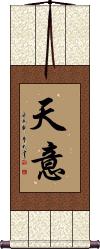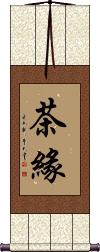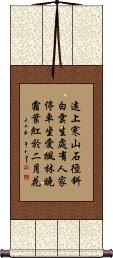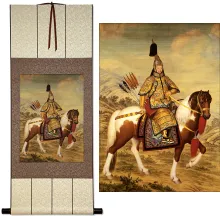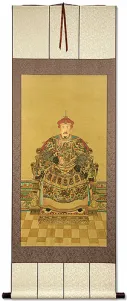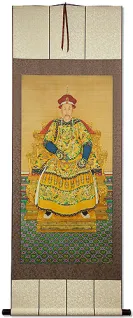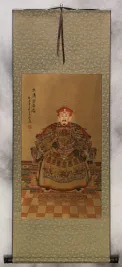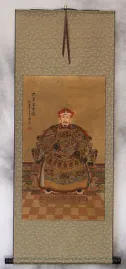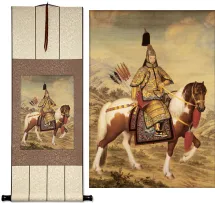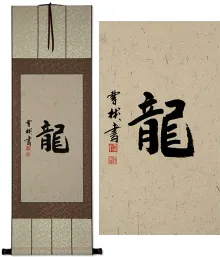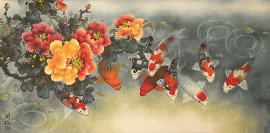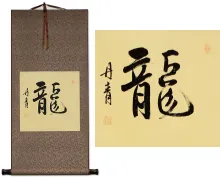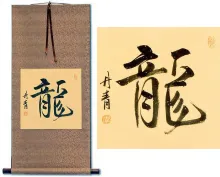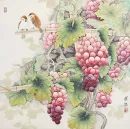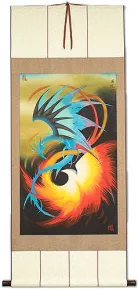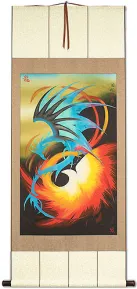Many custom options...
And formats...

Not what you want?
Try other similar-meaning words, fewer words, or just one word.
My Emperor in Chinese / Japanese...
Buy a My Emperor calligraphy wall scroll here!
Personalize your custom “My Emperor” project by clicking the button next to your favorite “My Emperor” title below...
Destiny Determined by Heaven
天意 is a way to express destiny in a slightly religious way.
天意 means “Heaven's Wish” or “Heaven's Desire,” with the idea of fate and destiny being derived as well. It suggests that your destiny comes from God / Heaven and that your path has already been chosen by a higher power.
My Japanese dictionary defines this word as “divine will” or “providence,” but it also holds the meaning of “the will of the emperor.” Therefore, I don't suggest this phrase if your audience is Japanese - it feels strange in Japanese anyway.
Undaunted After Repeated Setbacks
Persistence to overcome all challenges
百折不撓 is a Chinese proverb that means “Be undaunted in the face of repeated setbacks.”
More directly translated, it reads, “[Overcome] a hundred setbacks, without flinching.” 百折不撓 is of Chinese origin but is commonly used in Japanese and somewhat in Korean (same characters, different pronunciation).
This proverb comes from a long, and occasionally tragic story of a man that lived sometime around 25-220 AD. His name was Qiao Xuan, and he never stooped to flattery but remained an upright person at all times. He fought to expose the corruption of higher-level government officials at great risk to himself.
Then when he was at a higher level in the Imperial Court, bandits were regularly capturing hostages and demanding ransoms. But when his own son was captured, he was so focused on his duty to the Emperor and the common good that he sent a platoon of soldiers to raid the bandits' hideout, and stop them once and for all even at the risk of his own son's life. While all of the bandits were arrested in the raid, they killed Qiao Xuan's son at first sight of the raiding soldiers.
Near the end of his career, a new Emperor came to power, and Qiao Xuan reported to him that one of his ministers was bullying the people and extorting money from them. The new Emperor refused to listen to Qiao Xuan and even promoted the corrupt Minister. Qiao Xuan was so disgusted that in protest, he resigned from his post as minister (something almost never done) and left for his home village.
His tombstone reads “Bai Zhe Bu Nao” which is now a proverb used in Chinese culture to describe a person of strong will who puts up stubborn resistance against great odds.
My Chinese-English dictionary defines these 4 characters as “keep on fighting despite all setbacks,” “be undaunted by repeated setbacks,” and “be indomitable.”
Our translator says it can mean “never give up” in modern Chinese.
Although the first two characters are translated correctly as “repeated setbacks,” the literal meaning is “100 setbacks” or “a rope that breaks 100 times.” The last two characters can mean “do not yield” or “do not give up.”
Most Chinese, Japanese, and Korean people will not take this absolutely literal meaning but will instead understand it as the title suggests above. If you want a single big word definition, it would be indefatigability, indomitableness, persistence, or unyielding.
See Also: Tenacity | Fortitude | Strength | Perseverance | Persistence
Tea Fate
茶緣 is a special title for the tea lover. This kind of means “tea fate,” but it's more spiritual and hard to define. Perhaps the tea brought you in to drink it. Perhaps the tea will bring you and another tea-lover together. Perhaps you were already there, and the tea came to you. Perhaps it's the ah-ha moment you will have when drinking the tea.
I've been told not to explain this further, as it will either dilute or confuse the purposefully-ambiguous idea embedded in this enigma.
I happen to be the owner of a piece of calligraphy written by either the son or nephew of the last emperor of China, which is the title he wrote. It was given to me at a Beijing tea house in 2001. 茶緣 is where I learned to love tea after literally spending weeks tasting and studying everything I could about Chinese tea. I did not understand the significance of the authorship or the meaning of the title at all. Some 10 years later, I realized the gift was so profound and had such providence. Only now do I realize the value of a gift that it is too late to give proper thanks for. It was also years later that I ended up in this business and could have the artwork properly mounted as a wall scroll. It has been borrowed for many exhibitions and shows and always amazes native Chinese and Taiwanese who read the signature. This piece of calligraphy I once thought was just a bit of ink on a thin and wrinkled piece of paper, is now one of my most valued possessions. And fate has taught me to be more thankful for seemingly simple gifts.
Mountain Travels Poem by Dumu
This poem was written almost 1200 years ago during the Tang dynasty.
It depicts traveling up a place known as Cold Mountain, where some hearty people have built their homes. The traveler is overwhelmed by the beauty of the turning leaves of the maple forest that surrounds him just as night overtakes the day, and darkness prevails. His heart implores him to stop, and take in all of the beauty around him.
First, before you get to the full translation, I must tell you that Chinese poetry is a lot different than what we have in the west. Chinese words simply don't rhyme in the same way that English or other western languages do. Chinese poetry depends on rhythm and a certain beat of repeated numbers of characters.
I have done my best to translate this poem keeping a certain feel of the original poet. But some of the original beauty of the poem in its original Chinese will be lost in translation.
Far away on Cold Mountain, a stone path leads upwards.
Among white clouds, people's homes reside.
Stopping my carriage I must, as to admire the maple forest at nights fall.
In awe of autumn leaves showing more red than even flowers of early spring.
Hopefully, this poem will remind you to stop, and “take it all in” as you travel through life.
The poet's name is “Du Mu” in Chinese that is: ![]()
![]() .
.
The title of the poem, “Mountain Travels” is: ![]()
![]()
You can have the title, poet's name, and even “Tang Dynasty” written as an inscription on your custom wall scroll if you like.
More about the poet:
Dumu lived from 803-852 AD and was a leading Chinese poet during the later part of the Tang dynasty.
He was born in Chang'an, a city in central China and the former capital of the ancient Chinese empire in 221-206 BC. In present-day China, his birthplace is currently known as Xi'an, the home of the Terracotta Soldiers.
He was awarded his Jinshi degree (an exam administered by the emperor's court which leads to becoming an official of the court) at the age of 25 and went on to hold many official positions over the years. However, he never achieved a high rank, apparently because of some disputes between various factions, and his family's criticism of the government. His last post in the court was his appointment to the office of Secretariat Drafter.
During his life, he wrote scores of narrative poems, as well as a commentary on the Art of War and many letters of advice to high officials.
His poems were often very realistic and often depicted everyday life. He wrote poems about everything, from drinking beer in a tavern to weepy poems about lost love.
The thing that strikes you most is the fact even after 1200 years, not much has changed about the beauty of nature, toils, and troubles of love and beer drinking.
This in-stock artwork might be what you are looking for, and ships right away...
Gallery Price: $119.00
Your Price: $65.88
Gallery Price: $200.00
Your Price: $79.88
Gallery Price: $200.00
Your Price: $66.88
Gallery Price: $200.00
Your Price: $66.88
Gallery Price: $108.00
Your Price: $59.88
Not the results for my emperor that you were looking for?
Below are some entries from our dictionary that may match your my emperor search...
| Characters If shown, 2nd row is Simp. Chinese |
Pronunciation Romanization |
Simple Dictionary Definition |
欽 钦 see styles |
qīn qin1 ch`in chin makoto まこと |
More info & calligraphy: Qin / Chin(personal name) Makoto Imperial; to respect, reverence. |
皇 see styles |
huáng huang2 huang sume; sumera; sube; subera すめ; すめら; すべ; すべら |
More info & calligraphy: Emperor(prefix) (archaism) (honorific or respectful language) divine; imperial; (female given name) Miyuki ruler |
秦 see styles |
qín qin2 ch`in chin shin; hatashin しん; はたしん |
More info & calligraphy: Qin / Chin / Tan / Yasushi(hist) Qin dynasty (of China; 221-207 BCE); Ch'in dynasty; (surname) Yasushi a fine strain of rice |
聖 圣 see styles |
shèng sheng4 sheng hijiri ひじり |
More info & calligraphy: The Saint(1) highly virtuous monk; (2) (honorific or respectful language) monk; (3) Buddhist solitary; (4) (See 高野聖・1) Buddhist missionary; (5) saint (i.e. a virtuous person); (6) (archaism) (honorific or respectful language) emperor; (7) (in form 〜の聖) master; expert; (female given name) Mina ārya; sādhu; a sage; wise and good; upright, or correct in all his character; sacred, holy, saintly. |
龍 龙 see styles |
lóng long2 lung riyou / riyo りよう |
More info & calligraphy: Dragon(out-dated kanji) (1) dragon (esp. a Chinese dragon); (2) naga; semi-divine human-cobra chimera in Hindu and Buddhist mythology; (personal name) Riyou A dragon, dragon-like, imperial; tr. for nāga, which means snake, serpent; also elephant, elephantine, serpent-like, etc., cf. 那. |
天恩 see styles |
tenon てんおん |
More info & calligraphy: Grace from Heaven / Grace from God |
天皇 see styles |
tiān huáng tian1 huang2 t`ien huang tien huang tennou / tenno てんのう |
More info & calligraphy: Emperor of JapanEmperor of Japan; (place-name) Tennou Deva-king; the Tang monk 道悟 Daowu of the 天皇 Tianhuang monastery at 荊州 Jingzhou. |
夫人 see styles |
fū ren fu1 ren5 fu jen fujin(p); bunin(ok); hashikashi(ok) ふじん(P); ぶにん(ok); はしかし(ok) |
More info & calligraphy: Fujin(1) (ふじん, はしかし only) (honorific or respectful language) wife; Mrs; madam; (2) (ふじん only) (archaism) wife of a nobleman (aristocrat, etc.); (3) (ふじん, ぶにん only) (archaism) consort of the emperor A wife; the wife of a king, i. e. a queen, devi. |
恩寵 恩宠 see styles |
ēn chǒng en1 chong3 en ch`ung en chung onchou / oncho おんちょう |
More info & calligraphy: Grace / Favorgrace; favour; favor |
海神 see styles |
hǎi shén hai3 shen2 hai shen watatsumi わたつみ |
More info & calligraphy: Neptune / Poseidonsea god; Poseidon; Neptune; (female given name) Watatsumi |
皇帝 see styles |
huáng dì huang2 di4 huang ti koutei(p); oudai(ok) / kote(p); odai(ok) こうてい(P); おうだい(ok) |
More info & calligraphy: Emperor(honorific or respectful language) emperor |
聖誕 圣诞 see styles |
shèng dàn sheng4 dan4 sheng tan shōtan |
More info & calligraphy: Christmasemperor's birthday |
蘇丹 苏丹 see styles |
sū dān su1 dan1 su tan suudan / sudan スーダン |
More info & calligraphy: Sultan(ateji / phonetic) (kana only) Sudan |
蚩尤 see styles |
chī yóu chi1 you2 ch`ih yu chih yu shiyuu / shiyu しゆう |
More info & calligraphy: God of Warcraft(archaism) Chinese god of war |
謝恩 谢恩 see styles |
xiè ēn xie4 en1 hsieh en shaon しゃおん |
More info & calligraphy: Shayne(n,vs,vi) (expression of) gratitude |
俞 see styles |
yú yu2 yü |
yes (used by Emperor or ruler); OK; to accede; to assent |
倖 幸 see styles |
xìng xing4 hsing yuki ゆき |
trusted; intimate; (of the emperor) to visit; variant of 幸[xing4] (female given name) Yuki |
卿 see styles |
qīng qing1 ch`ing ching kei / ke けい |
high ranking official (old); term of endearment between spouses (old); (from the Tang Dynasty onwards) term used by the emperor for his subjects (old); honorific (old) (pronoun) (1) (honorific or respectful language) (masculine speech) (archaism) (used to address someone of equal or lower status) you; (pronoun) (2) (honorific or respectful language) (archaism) (used by a ruler to address a subject) you; (given name) Akira you |
垚 see styles |
yáo yao2 yao |
variant of 堯|尧, legendary emperor Yao, c. 2200 BC; embankment |
夌 see styles |
líng ling2 ling |
to dawdle; the name of the father of the Emperor Yao |
㍽ see styles |
dà zhèng da4 zheng4 ta cheng taishou / taisho たいしょう |
Taishō, Japanese era name, corresponding to the reign (1912-1926) of emperor Yoshihito 嘉仁[Jia1 ren2] (hist) Taishō era (1912.7.30-1926.12.25); Taisho era; (personal name) Hiromasa |
奏 see styles |
zòu zou4 tsou sou / so そう |
to play music; to achieve; to present a memorial to the emperor (old) (See 奏する・そうする・1) report to the emperor; (female given name) Melody proclaims |
媧 娲 see styles |
wā wa1 wa |
surname Wa; sister of legendary emperor Fuxi 伏羲[Fu2xi1] |
崩 see styles |
bēng beng1 peng nadare なだれ |
to collapse; to fall into ruins; death of king or emperor; demise (female given name) Nadare |
帝 see styles |
dì di4 ti mikado みかど |
emperor emperor (of Japan); mikado; (female given name) Mikado Ruler, sovereign; translit. t. |
㍻ see styles |
píng chéng ping2 cheng2 p`ing ch`eng ping cheng heisei / hese へいせい |
Heisei, Japanese era name, corresponding to the reign (1989-2019) of emperor Akihito 明仁[Ming2 ren2] Heisei era (1989.1.8-2019.4.30); (place-name) Heisei |
㍾ see styles |
míng zhì ming2 zhi4 ming chih meiji / meji めいじ |
Meiji, Japanese era name, corresponding to the reign (1868-1912) of the Meiji emperor (hist) Meiji era (1868.9.8-1912.7.30); (p,s,g) Meiji |
㍼ see styles |
zhāo hé zhao1 he2 chao ho shouwa / showa しょうわ |
Shōwa, Japanese era name, corresponding to the reign (1925-1989) of emperor Hirohito 裕仁[Yu4 ren2] (1) (hist) Shōwa era (1926.12.25-1989.1.7); (adjectival noun) (2) (colloquialism) reminiscent of the Shōwa era; Shōwa-nostalgic; old-fashioned; quaint; old-school; (given name) Terukazu |
朔 see styles |
shuò shuo4 shuo saku さく |
beginning; first day of lunar month; north (1) {astron} new moon; (2) first day of the lunar month; (3) (hist) next year's calendar and decrees (in ancient China; distributed by the Emperor at year's end); (given name) Hajime |
朕 see styles |
zhèn zhen4 chen chin ちん |
(used by an emperor or king) I; me; we (royal "we"); (literary) omen (pronoun) (dated) (first person pronoun used by the Emperor) We |
Click here for more my emperor results from our dictionary
The following table may be helpful for those studying Chinese or Japanese...
| Title | Characters | Romaji (Romanized Japanese) | Various forms of Romanized Chinese | |
| Destiny Determined by Heaven | 天意 | teni | tiān yì / tian1 yi4 / tian yi / tianyi | t`ien i / tieni / tien i |
| Undaunted After Repeated Setbacks | 百折不撓 百折不挠 | hyaku setsu su tou hyakusetsusutou hyaku setsu su to | bǎi zhé bù náo bai3 zhe2 bu4 nao2 bai zhe bu nao baizhebunao | pai che pu nao paichepunao |
| Tea Fate | 茶緣 茶缘 | chá yuán / cha2 yuan2 / cha yuan / chayuan | ch`a yüan / chayüan / cha yüan | |
| Mountain Travels Poem by Dumu | 遠上寒山石徑斜白雲生處有人家停車坐愛楓林晚霜葉紅於二月花 远上寒山石径斜白云生处有人家停车坐爱枫林晚霜叶红于二月花 | yuǎn shàng hán shān shí jìng xiá bái yún shēng chù yǒu rén jiā tíng chē zuò ài fēng lín wǎn shuàng yè hóng yú èr yuè huā yuan3 shang4 han2 shan1 shi2 jing4 xia2 bai2 yun2 sheng1 chu4 you3 ren2 jia1 ting2 che1 zuo4 ai4 feng1 lin2 wan3 shuang4 ye4 hong2 yu2 er4 yue4 hua1 yuan shang han shan shi jing xia bai yun sheng chu you ren jia ting che zuo ai feng lin wan shuang ye hong yu er yue hua | yüan shang han shan shih ching hsia pai yün sheng ch`u yu jen chia t`ing ch`e tso ai feng lin wan shuang yeh hung yü erh yüeh hua yüan shang han shan shih ching hsia pai yün sheng chu yu jen chia ting che tso ai feng lin wan shuang yeh hung yü erh yüeh hua |
|
| In some entries above you will see that characters have different versions above and below a line. In these cases, the characters above the line are Traditional Chinese, while the ones below are Simplified Chinese. | ||||
Successful Chinese Character and Japanese Kanji calligraphy searches within the last few hours...
